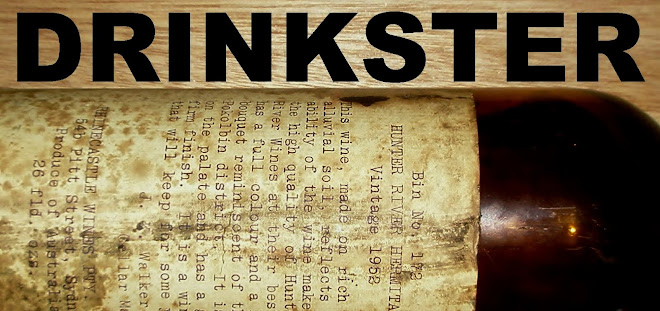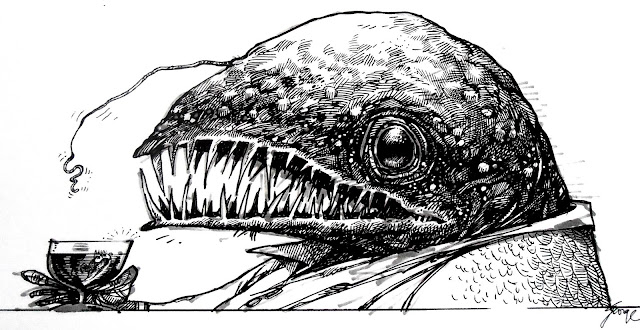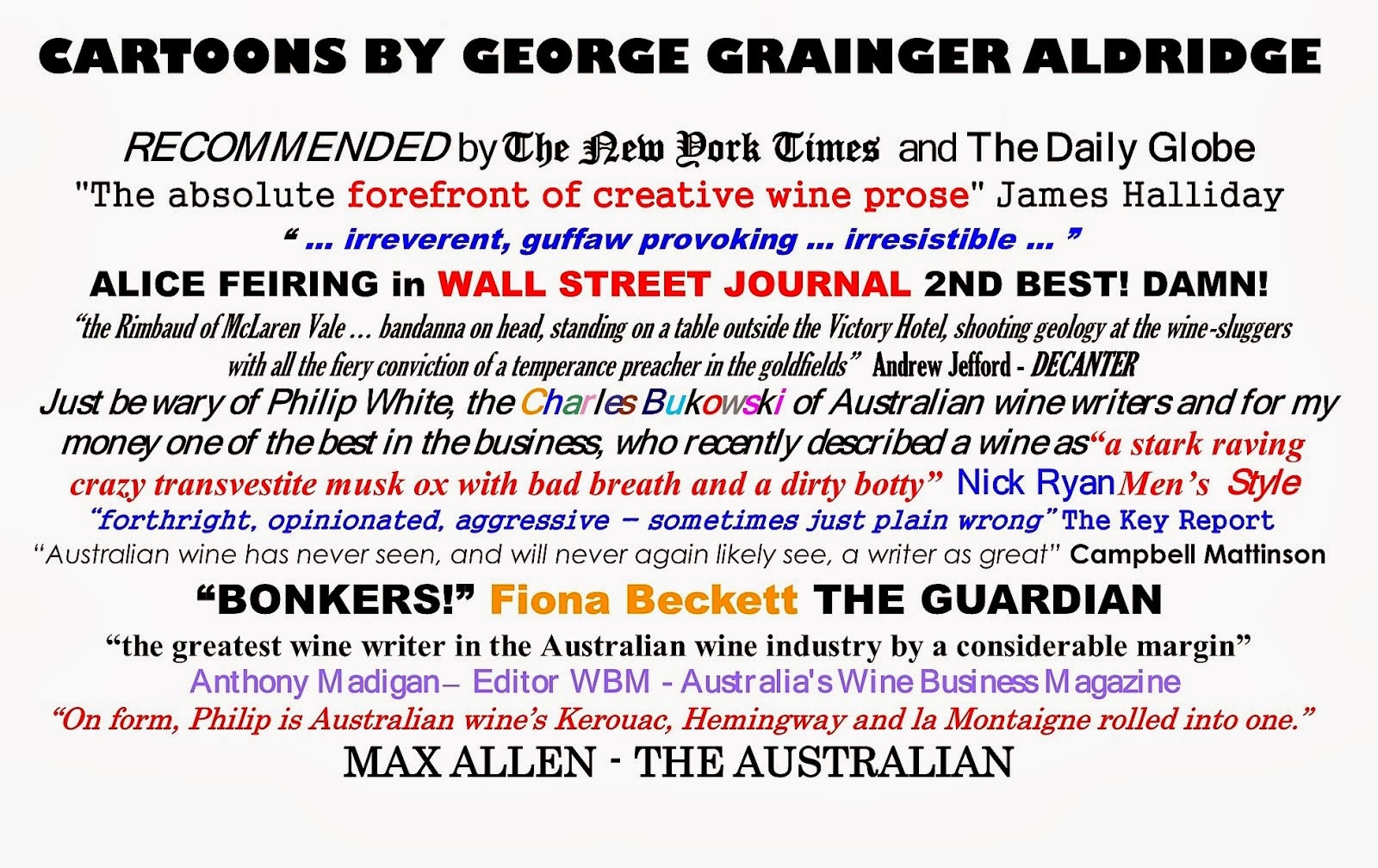 WET Adds To Aussie Wine Glut
WET Adds To Aussie Wine GlutWrecks Murray-Darling & Todd
Many Good Folks Need Big Help
Philip White's delivery at the launch of the report Alcohol Taxation Reform - Starting With The Wine Equalisation Tax, held Tuesday in Parliament House, Canberra. Click here to download the Allen Consulting Group's Report to The Alcohol Education & Rehabilitation Foundation
At school, they never teach us what Australia means.
The word, austral, is a vital clue to the nature of this country. It comes from the Greek αυδτηος, which means severe, and gradually morphed to mean harsh, bitter, astringent, without luxury.
And yet we blithely live as if this ancient worn-out desert was a lush tropical garden.
It’s like the larrikin Aussie calling redheads “Blue” - the opposite of the reality.
The Wine Equalisation Tax, the WET is the same.
While it is a pertinent acronym in the moist sense, ensuring Australians have access to wine so cheap it’s sometimes around 25 cents a standard drink, and depends upon an endless supply of impossibly cheap water in the Murray-Darling, there’s nothing equal about this tax.
While it was set up as a rebate to assist the small specialist wineries during the rewrite of the tax laws at the beginning of the GST, it is now quite clearly doing the opposite.
The WET scheme is completely, unequivocally biased in favour of the cheapest, most destructive plonk. The more effort you put into growing and making a really good clean wine, the more the government will tax you. Build a refinery, and use ridiculous amounts of irrigation water to make desert goon-bag quality, three times the strength of average beer and often full of sugar … and the government expects so little tax that you can sell this for less than the price of bottled water.
It’s important to realize that even something as simple, on the face of it, as Wine Australia, the taxpayer-subsidised governing body of the wine industry, and the industry-funded Winemakers Federation Australia, are actually mechanisms which makes it look like the wine industry is indeed one industry.
It’s not. It’s really several quite distinctive and separate industries which are often in direct competition with each other.
There are big industry councils, of course, like Wine Australia and Winemakers Federation, but these invariably act in support of the status quo with their favour protecting the biggest companies. Even the Winemakers Federation was hi-jacked – it started in the 80s as the Small Winemakers’ Association to counterbalance the Australian Wine and Brandy Corporation’s total manipulation by the biggest producers.
But soon the Small Winemakers was everybody’s Winemakers Federation of Australia, a virtual lobbying duplicate of the Australian Wine and Brandy, which is now Wine Australia. It was Brian Croser and Ian Sutton of the WFA who “negotiated” the WET to appease the biggest refineries, throw the littlies a bone, and keep the whole thing looking like it was one united industry.
There are about 2500 wine producers. Three quarters of them crush less than 100 tonnes per year. While there are too many of them … doctors and lawyers with a vanity brand, planted with the wrong grapes in the wrong places for all the wrong reasons … scattered amongst these 1800 wineries are the nuts-and-berries wineries with ivy, a fireplace and a famous dog
… and really good wine …
They provide the enormous refineries with good cover; some heart and soul and wholesomeness.
They lend the Australian wine business its legitimacy. They provide its gastronomic interest. They keep many thousands of restaurants in profit.
Government Tourism Commissions seem to think these tiny wineries exist purely to shout free drinks for tourists. These aren’t free, of course – having paid to grow and make the wine, the winemaker must pay tax on every bottle poured for tasting.
But once you get past these conveniently alluring littlies, you hit those ethanol refineries very abruptly.
About 42 per cent of the wine consumed in Australia is in bladder packs. These figures are from the 2011 Australian and New Zealand Wine Industry Directory.
The two biggest companies, Accolade and Treasury, make about 42% of Australia’s total wine, and account for about 45% of all sales.
The top twenty producers account for about 90% of total sales.
That leaves 2457 producers competing for 10% of total sales.
For many of these, the WET rebate is the only profit they make – they are very vulnerable, and we shall see many go to the wall after the disastrous vintage of 2011 – the second wettest since the wine industry began.
It also saw some perverse rorting of the WET.
The biggest companies have always preferred an oversupply of grapes. They are expert at ensuring this occurs.
A great example was the Strategy 2025 devised by the big stakeholders in 1995. That was a thirty-year strategic plan: a template for the managed growth of the entire Australian wine industry over three decades.
They preached that gospel so loudly to politicians, regional councils and speculators that within four years Australia had completed the entire thirty year program of vineyard expansion.
Plantings have continued apace since then, and now we have an enormous glut of unsold wine, and once the river goes back to normal, a scary shortage of water.
I live in McLaren Vale, where profits are higher than most other regions, and yet some of the growers of the poorer quality fruit have not picked a crop for two years.
The problem is much worse in many other regions, like the irrigated inland.
This year, more than any other, saw the rise of the Virtual Winemakers – people becoming so-called “wine producers”. They’d rock up at the gate of the struggling grower, who had no buyer and couldn’t afford to pick, offer to take the crop, basically borrow it for a while, while they’d send it to a contract winery and have it vinified.
The deal is that they eventually pay the growers for the fruit when the bulk wine is sold, less the cost of manufacture and handling.
So you have an increase of Dodgy Brothers who have no winemaking expertise, no real investment in the business, no winery plant, no oak and no vineyards, pocketing the WET rebate while they flood the market with even more, lower-priced poor quality bulk plonk.
There is now pressure on larger wineries to split up into smaller companies in order to pocket the WET. Business models are in circulation based on this easy windfall. The huge retailers of bulk cleanskin plonk love it!
This is disastrous for the nuts-and-berries wineries who have developed vineyards for generations, and have gradually invested enough money to have built efficient little wineries and send an offspring or two to study winemaking and viticulture.
These strugglers, the makers of the best and most distinctive wines, have constantly worked their vineyards to keep up with changing tastes and fashions, and develop new wine styles that the refineries will soon be copying and devaluing. The little guys take the risk, and must make a reasonable dollar, or they’ll die.
There is no other industry quite like this small end of the wine business.
First you are a primary producer, a plant physiologist, farmer, soil expert and environmental scientist. Then you become a secondary producer, a winemaker, a biochemist with a nose for the odd good forest of oak in France or Romania or somewhere.
After your industrialist phase you must become a marketing and public relations expert, a packaging expert, a transport aficionado, and you learn about licensing and export law and international sales. You must be fluent in haute cuisine and the restaurant world.
Of course most are not very good at all of these skills, and amongst these you’ll find those who couldn’t exist without a rebate.
But if they are to be protected, they should first be protected from rivals with none of these investments, skill, or long-term planning.
And they shouldn’t have to hope for protection from an unfair tax which clearly discriminates against them whilst masquerading as a support.
Neither should they be forced to compete with ethanol refiners – barely taxed at all - who use enormous amounts of water mining the Mallee for sugar, and wreak environmental, social and economic destruction at both manufacture and consumption ends of this nasty, depressing chain.
 Ignoring the shameful health costs the big ethanol industry wreaks, there is no doubt that the WET rebate perpetuates the delusion of a sustainable bladder-pack industry which depends upon ongoing supplies of cheap water which we simply do not have.
Ignoring the shameful health costs the big ethanol industry wreaks, there is no doubt that the WET rebate perpetuates the delusion of a sustainable bladder-pack industry which depends upon ongoing supplies of cheap water which we simply do not have.Alcohol tax should indeed be equalized, and there’s one very obvious way of doing that.
We need to devise a carefully planned, staged move from the ridiculous and illogical WET to an across-the-board excise on ethanol.
My colleagues, and this report, have, and will, continue to address the damage wrought at the receiving end of all this stupidity.
I trust I have begun to address the damage the WET causes to communities at the supply end. Entire townships that rely completely on this flaky business will need lots of help. Many communities in the irrigated inland will need counselling, rebuilding, cash and perhaps even relocating.
In finishing, I’d like to quote a friend who grows grapes and makes wine in his little Inkwell vineyard, Dudley Brown, a former chair of the McLaren Vale Grape Wine And Tourism Association.
“While the wine industry isn’t solely to blame for this [health mess], it insists on maintaining its tax-advantaged status as Australia’s low cost provider of ethanol. On the other hand, it asserts that wine is a hedonic product – that we buy and drink wine because we enjoy its flavor and alcoholic properties and that overwhelmingly, we do so responsibly. Fair enough. My confusion is this: if wine tastes better and is taxed the same as other forms of ethanol, why is the wine industry worried about competition?”
So it’s time we had a big rethink about what Australia means, what it is. We need a little less delusive wet and lot more dry austerity – and fairness – in the way we tax ethanol.

FURTHERMORE:
http://www.abc.net.au/worldtoday/content/2011/s3310869.htm
http://www.heraldsun.com.au/news/breaking-news/research-says-tax-makes-wine-glut-worse/story-e6frf7jx-1226130734621
http://www.smh.com.au/national/wine-tax-reform-plan-to-hit-purse-but-help-the-body-20110905-1ju9z.html
http://www.canberratimes.com.au/news/national/national/general/tax-changes-urged-to-stop-cheap-alcohol/2282074.aspx
http://au.news.yahoo.com/thewest/a/-/newshome/10193276/wine-plan-may-double-cask-price/
.














6 comments:
WHO WRITES THIS SHIT? How many of those reporters actually begin to understand the WET?
You're a brave fool, WhiteMan. The WET is the GRAIL! How dare you!
Why doesn't the Daily Wine News bulletin link to this, Whitey?
If you think that the WET tax is the profit that makes the wine cask viable you clearly have no idea.
Get the WET rebate removed and you will not have many small wineries to write about Mr White!!!
I have in no way suggested that the WET tax is the profit which makes the wine cask viable. I DO suggest that were it taxed fairly and equally, the wine cask would play a much reduced role in environmental and economic damage in the Murray-Darling, and in the shocking health issues of the Todd, a metaphor for many other ravaged sections of our society.
I DO ALSO suggest that many of the small wineries are not profitable: many, indeed are not wineries at all, but virtual artifices that exist only by rorting the WET.
The small wineries are not profitable as they do not get the economies of scale of the big refineries as you call them but have to sell to the retailers etc at the same price. Thats why the WET rebate plays a significant role in making these small companies profitable.
Sure there are the fringe dwellers who will exploit any loophole in any industry.
As for the issues in the Todd and other communities, just look what happened in Qld when the sale of full strenght beer was stopped and retail availability reduced, up went the sale of home brew kits and tonnes of sugar to make beer at 10% alc. Society cannot control everyone and it is proven that higher taxation does not change addictions!!!
Post a Comment